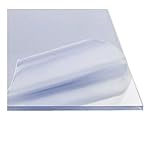All Categories


PVC (Polyvinyl Chloride) Perforated Sheet, Staggered Holes, Opaque Gray, 0.250" Thickness, 32" Width, 48" Length, Staggered 1/2" Holes, 0.6875" Center to Center
Share Tweet
of brand new stock?
or
Need this item ASAP?
Check if this is available on Amazon
or available in other sites
Send us the link so we can buy for you








PVC (Polyvinyl Chloride) Perforated Features
-
PVC offers an excellent balance of strength and weight, and is typically resistant to acids, alkalis, and most other inorganic chemicals
-
Color is opaque gray
-
Holes are staggered
About PVC (Polyvinyl Chloride) Perforated
The opaque gray PVC perforated sheet has staggered holes. PVC (polyvinyl chloride), also known as vinyl, is a durable plastic that provides an excellent balance of strength and weight, and is typically resistant to acids, alkalis, and most other inorganic chemicals. The material is also dimensionally stable, due in part to its low moisture absorption.Plastic refers to a group of synthetic or semi-synthetic materials that have been engineered to achieve specific properties. The most notable characteristics of plastics are its low weight, machinability, corrosion resistance, and typically good thermal and electrical insulating properties. Certain plastic grades also offer optical transparency similar to glass, low-friction or self-lubricating surfaces, and exceptional impact resistance. Depending on their properties, certain plastic grades can be used as alternatives to metal, glass, and ceramic. Unlike metal, plastic may experience creep, which is deformation caused by longtime exposure to a constant load.Tensile strength, used to indicate the material’s overall strength, is the peak stress it can withstand before it breaks. Corrosion resistance describes the material's ability to prevent deterioration caused by atmosphere, moisture, or other medium. Wear resistance indicates the ability to prevent surface damage caused by contact with other surfaces. Toughness describes the material's ability to absorb energy before breaking, while hardness (commonly measured as indentation hardness) describes its resistance to permanent surface deformation. Impact resistance is the measure of a material’s ability to absorb a shock of energy before breaking.

























